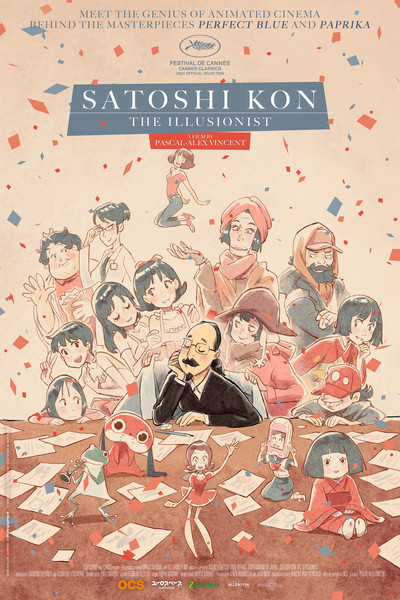Review: Satoshi Kon: The Illusionist
by Alicia Haddick,Satoshi Kon was a one-of-a-kind creative force within the anime industry, a visionary director with a style that was distinctly his own. Despite directing just four feature films and a TV anime series throughout his career, the impact of his work can still be felt both inside and outside the industry as one of the most influential and important voices in 21st-century animation. So unique was Satoshi Kon's directorial style, in fact, that following his premature death from pancreatic cancer at the age of 46, his then-in-production film The Dreaming Machine floundered and was eventually canceled because no other director could fill those shoes and replicate his vision.
Creating a documentary that both celebrates and honors this legacy was the difficult task placed at the hands of French director Pascal-Alex Vincent when he selected the late director to be the subject of his latest documentary. What more is there to say that hasn't already been said about a director whose work stands as some of the most beloved animated media ever produced, and someone who has inspired even Hollywood directors like Christopher Nolan and Darren Aronofsky?
What we're offered over the course of 90 minutes is a rather conventional look at the work of Satoshi Kon through the eyes of his closest collaborators and those inspired by his work. With his manga touched upon only briefly except for his collaboration with Mamoru Oshii, the movie offers deep dives into Perfect Blue, Millennium Actress, Tokyo Godfathers, Paranoia Agent, and Paprika in a simple chronological exploration of Kon's career. In doing so, we touch on the commercial difficulties he faced despite adoration from critics, alongside the creativity and ideas that drove each of these productions from start to finish.
Considering this is a film about a director known for his ability to augment space and linear structure for the purpose of storytelling (you need only look at how Kon plays with perspective in Perfect Blue, or Japanese movie history in Millennium Actress), it's perhaps disappointing that Vincent has taken a rather plain talking-heads approach to exploring this rich subject matter. Furthermore, anyone with knowledge of Kon's career and work going into the film will find much of the information a repetition of stuff they already know. A tantalizing glimpse at what could have been for The Dreaming Machine with rarely-seen storyboards is a more-than-welcome exception to this rule.
Still, this feels unimportant when such a rich list of collaborators and inspired creators have lined up to speak about Kon's work. Vincent has secured an unprecedented level of access to creators from across the industry, with fellow directors like Mamoru Oshii, Masashi Ando, and Mamoru Hosoda contributing to the movie alongside people such as Aya Suzuki, one of the most interesting interview subjects for her perspective as an animator as she discusses Kon's labor advocacy work for animators. Even Madhouse co-founder Masao Maruyama is interviewed here, as is Sadayuki Murai (screenwriter for Perfect Blue). Each speaks of Kon with reverence for his talent and ability, sharing fond memories like a school reunion about an old friend who couldn't make it to the party.
There's also time for Andrew Osmond, critic and author of the book this film gets its namesake from, to discuss the impact of his work on the anime industry. This film is a who's who of people from within and beyond the anime industry, and when you have the likes of Requiem for a Dream director Aranofsky sharing anecdotes about letters seeking permission to homage the director for a scene in the film, it's easy to ignore the fact you've heard a lot of this before.
What's perhaps a little disappointing is that the film feels like it consciously avoids the opportunity to offer a more layered and perhaps even somewhat flawed depiction of Kon's career. Interspersed throughout the films are clips of old interviews from Satoshi Kon that characterizes his approach to work as perfectionist in nature, something soon contrasted by the heated conflicts we learn about from interviews with Oshii and his producers. They even admit to seeing more than one face from Kon, with the implication being these other faces were not as friendly as the one we've come to associate with the man.
Yet rather than trying to understand Kon as a flawed yet passionate auteur, these are brushed over to solely emphasize his acclaimed filmography without exploring how this ‘other side’ informed his work. Similarly, for a film keen to point out the debt that productions like Black Swan and Inception from Hollywood owe to the psychological complexities of his movies, far less time is spent exploring how animation is interwoven into Kon's approach to filmmaking as it is exploring factoids like how John Wayne inspired Tokyo Godfathers.
While Satoshi Kon: The Illusionist is undoubtedly a highly engaging documentary filled with high-profile interviews on an interesting subject, your mileage with the film will depend on what you want from this experience. If you simply want a rundown of his career with heartfelt interviews from voice actors and animators moved to tears by his work, that's exactly what you're going to get. If you already have a baseline knowledge of his career and hope to learn something new, however, you may be left wanting more.
discuss this in the forum (3 posts) |
this article has been modified since it was originally posted; see change history
